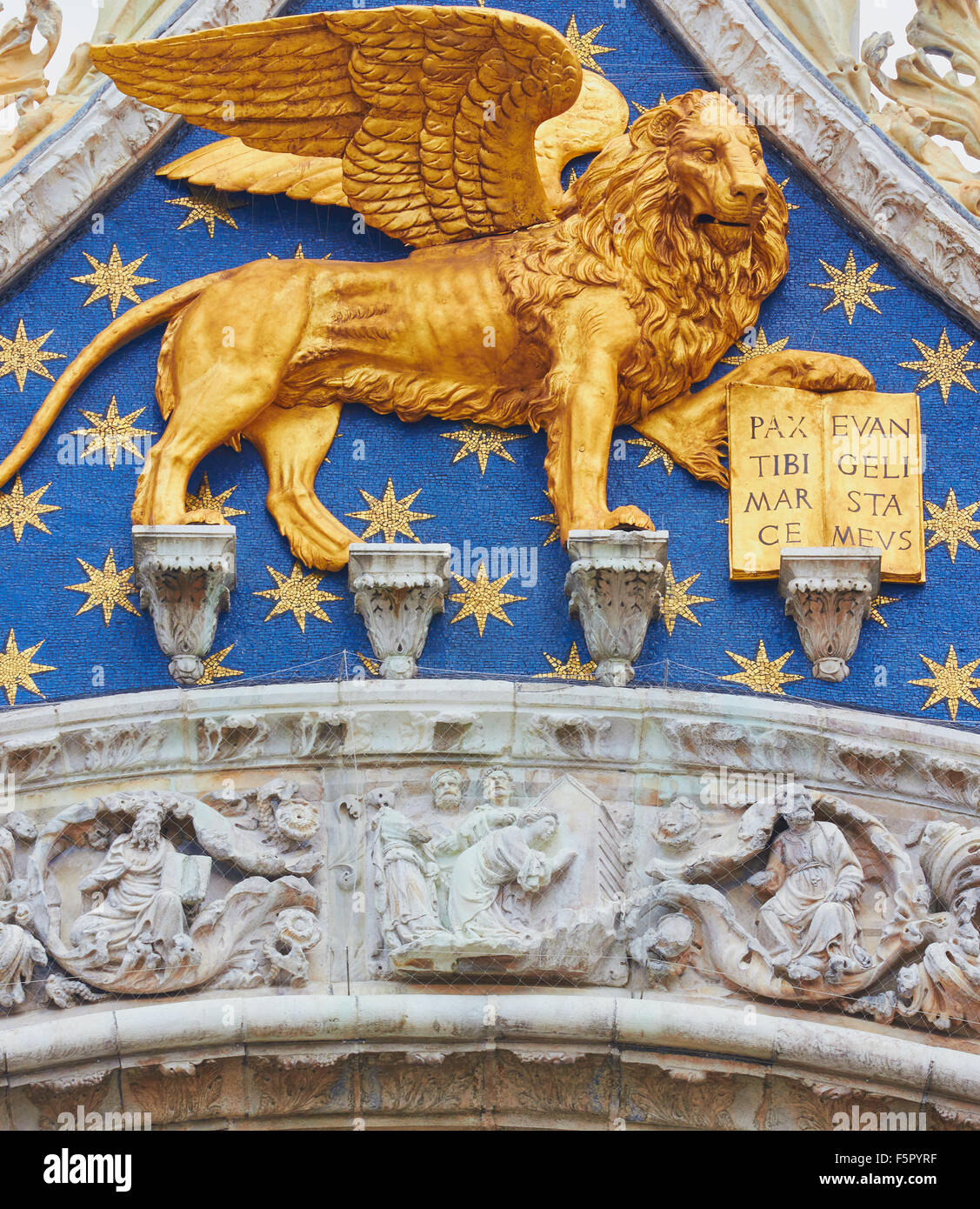
Winged lion the symbol of Venice on Basilica Di San Marco Italy
The Lion of Venice is an ancient bronze winged lion sculpture in the Piazza San Marco of Venice, Italy, which came to symbolize the city — as well as one of its patron saints, St Mark — after its arrival there in the 12th century. The sculpture surmounts one of two large granite columns in the Square, thought to have been erected between.
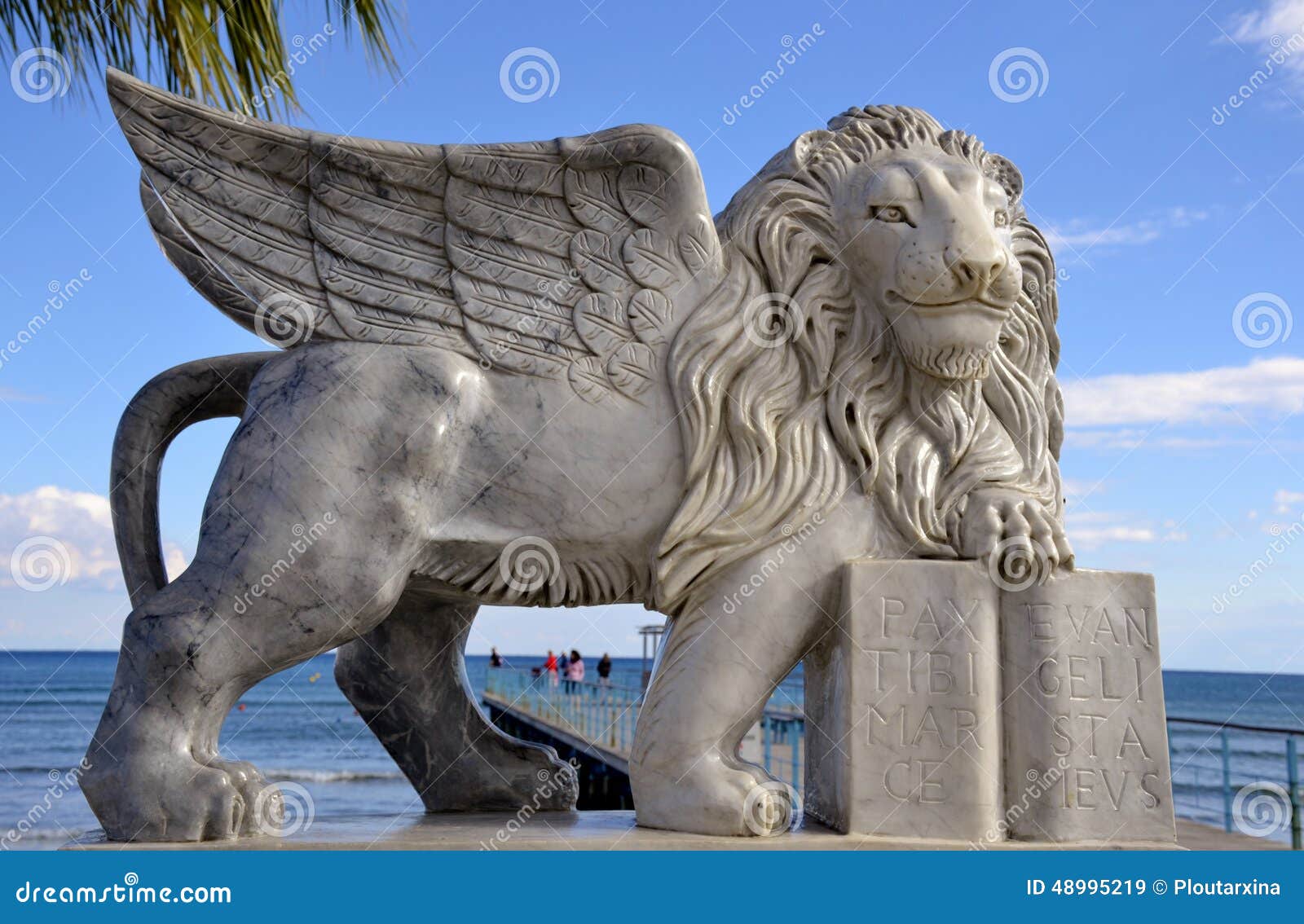
Winged lion of Venice stock image. Image of symbol, landscape 48995219
1 Reply Everyone who visits Venice can't help but notice the city's special relationship with lions. In Venice lions are everywhere: on pedestals, on walls, on paintings inside Venice's museums and churches, and even on door bells of apartment buildings.
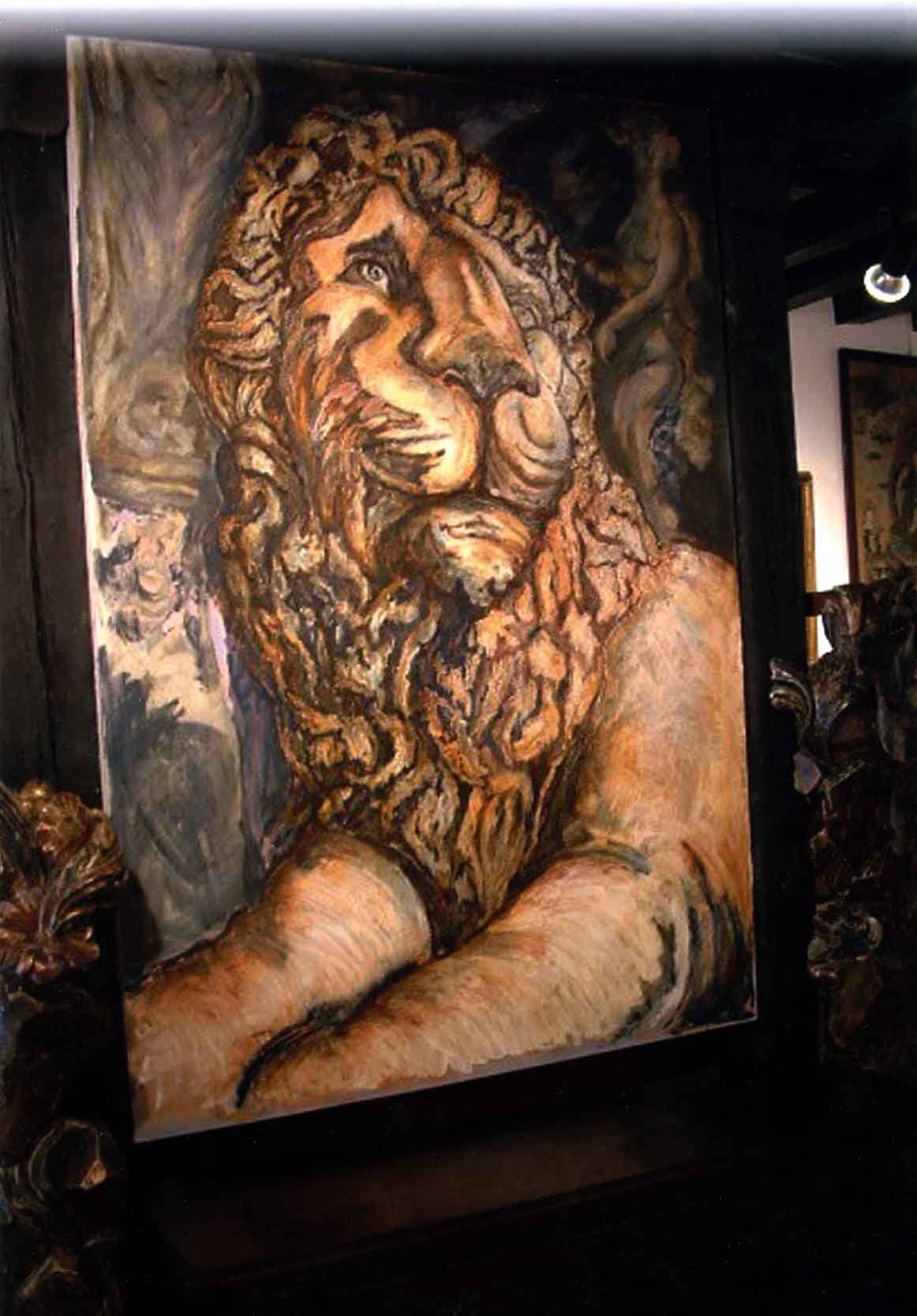
"The Lion of Venice" Demandez une estimation
The Venetian lion normally has wings, very often holds a book below its paw, and sometimes is completed by a halo around its head. These three elements (wings, book, halo) reveal it as a symbol of Saint Mark the Evangelist, patron saint of the city.

Sculpture of Winged Lion of Venice at Doge Palace, Venice, Ital Stock
TripAnthropologist Meet the Guardian Lions of Venice Lions are the symbol of the city of Venice, of the wider Venetian Republic, and of St. Mark, the patron Saint of Venice. Lions adorn many public spaces around the world, but few places show as much devotion to these fierce felines as Venice.

The Lion of Saint Mark in Venice symbol of magnificence and power
The Lions of Venice Myra Robinson | Thu, 07/14/2011 - 04:49 The proud image of the lion is everywhere in Venice; gazing down from buildings, looking out from the keystone of an archway, or standing on fluted columns. The more you look, the more you see: no one knows how many there are.
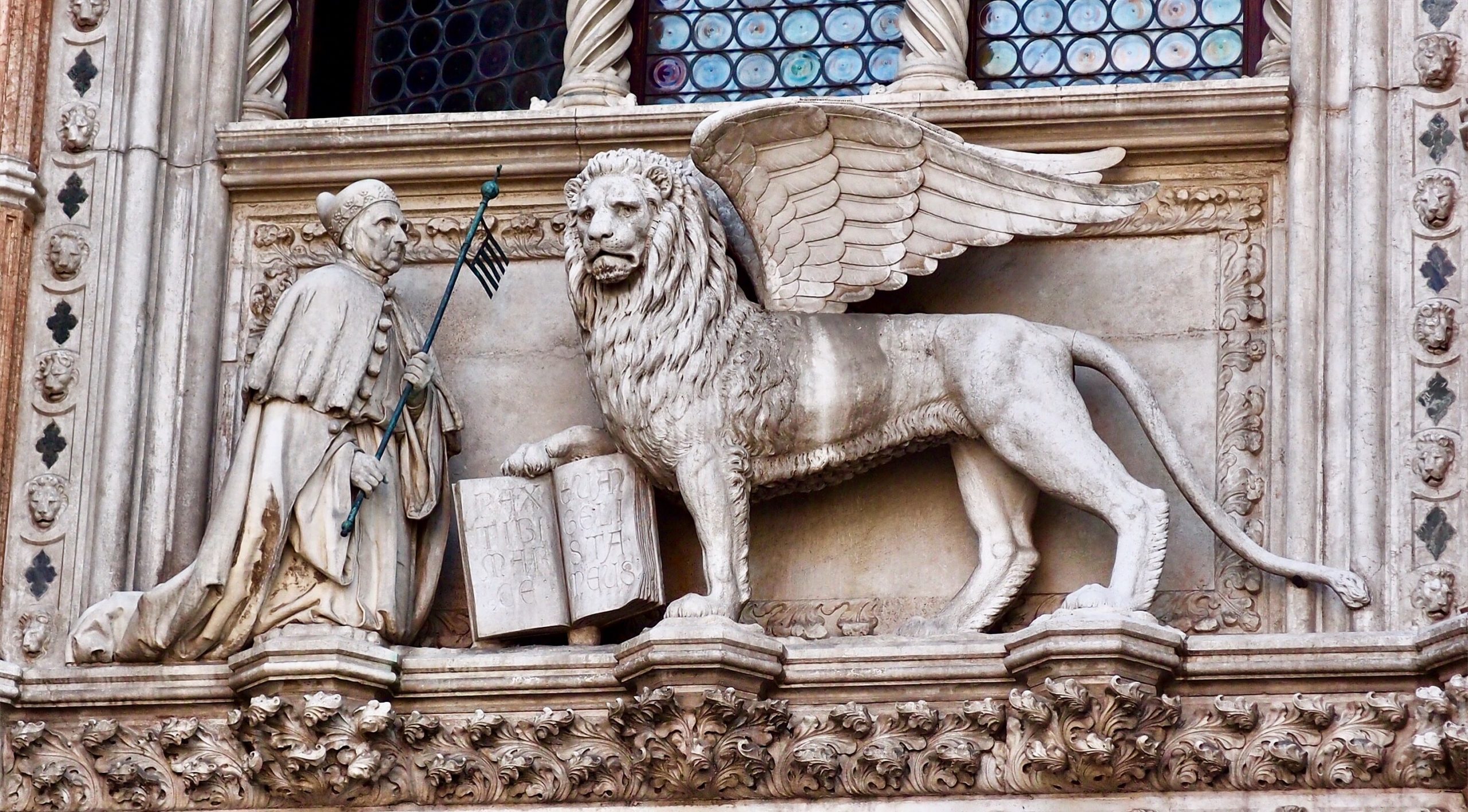
The Lion Explained When in Venice
The Piraeus Lion is a marble lion displayed in Venice, specifically at the entrance of the Venetian Arsenal . As its name suggests, the statue was originally from Piraeus, the port of Athens. But it was looted during the 17th century and brought to Venice. Since the city's patron saint is Saint Mark , whose symbol is a lion, it is not.

The Lions of Venice ITALY Magazine
A 19th-century Lion of St. Mark from a monument on Campo Manin. (Photo by Nino Barbieri) There are lions all over the city of Venice because that it the city's symbol. It is the city's symbol because this is the city of San Marco—Mark the Evangelist—and the lion was St. Mark's symbol. Venice is the city of St. Mark because, well, because.

Highly Defined Reality A Daily Photo Blog by Micah Goff The winged
Lion of Venice, Piazza San Marco (Venice) Mark and Venice Venetian tradition states that when Mark was traveling through Europe, he arrived at a lagoon in Venice, whereby an angel appeared to him and said, " Pax tibi Marce, evangelista meus. Hic requiescet corpus tuum. " ("Peace be with thee, O Mark, my evangelist. Here thy body will rest.").

The haunted lion of Venice Archaeology Mysteries
The Lion of Venice is an ancient bronze sculpture of a winged lion in the Piazza San Marco of Venice, Italy, which came to symbolize the city - as well as one of its patron saints, St Mark - after its arrival there in the 12th century.

"Lion of Venice" Sleeveless Top for Sale by UriHavenston Redbubble
Universally known as the symbol of Venice, its ancient Republic, but also of the region of Veneto and the Italian Militar Marin, the winged lion of Venice is usually interpreted as an allegory of Saint Mark, referring to an old tradition according to which an angel, in the form of a winged lion, would have indicated the lagoon territory of Venet.

Mark Twain and the Winged Lion of Venice
The Lion of St. Mark, also known as the Lion of Venice, is a statue that can be found all over Venice and represents trust, strength, courage, and loyalty. It is one of the primary sightseeing attractions in Venice, and St. Mark's Basilica.

Venice and The Lion of St. Mark History, Mystery, and Glory
The Lion of Venice is an ancient bronze sculpture of a winged lion in the Piazza San Marco of Venice, Italy, which came to symbolize the city - as well as one of its patron saints, St Mark - after its arrival there in the 12th century.

Lion of Venice stock image. Image of famous, gondola 23499167
By 1177 the majestic lion was fluttering on the first-ever Venetian flag. It stood resplendent, red on a pure white or maritime blue background, to denote both Venice's lagoon location and its dominance over the seas. The lion flew from merchant ships and naval galleons sending the name of Venice around the Adriatic Sea and beyond.

Piraeus Lion, Venice stock photo. Image of strong, italy 55402208
The Lion of St. Mark, the famous winged Lion, is for everyone the symbol of Venice. The link between St. Mark and Venice comes from an ancient legend, according to which the Evangelist Mark, during his journey from Aquileia to Rome, found a storm and he took refugee in a small island of the lagoon.
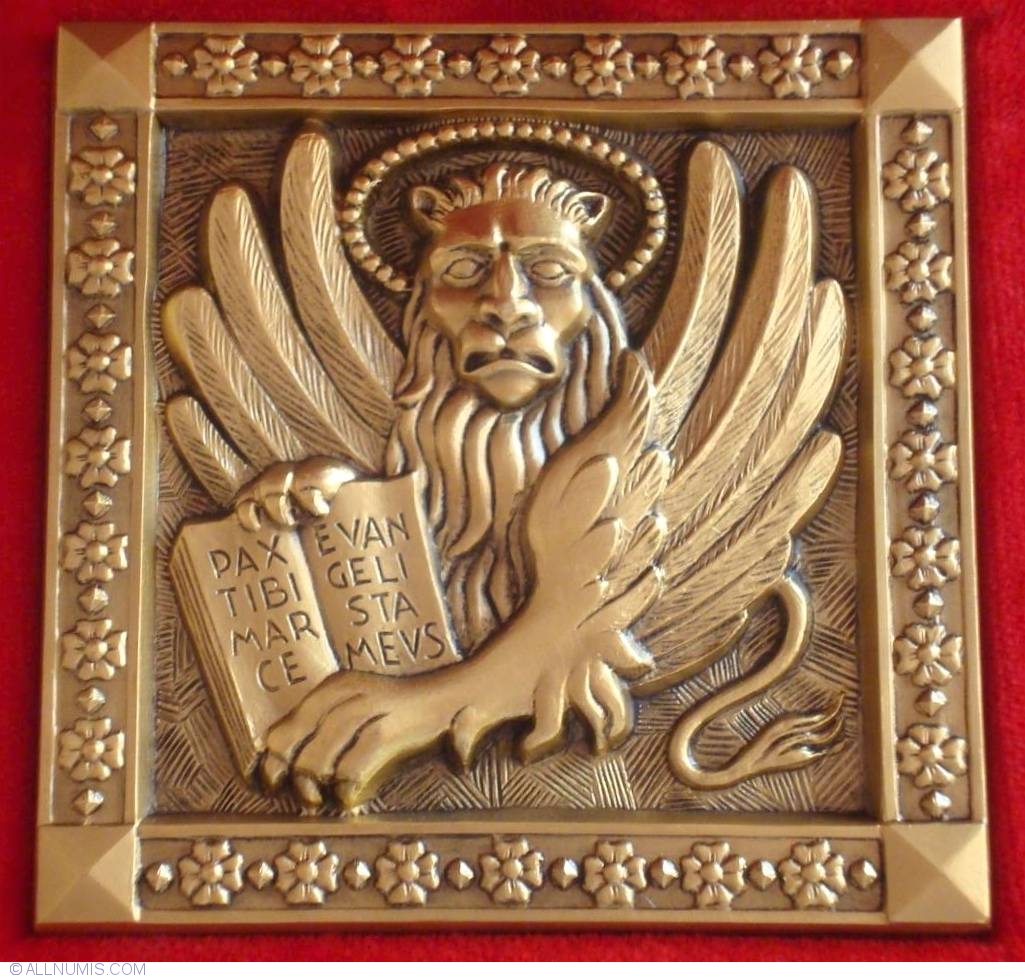
The Lion of Venice, Commemorative Italy Medal 6819
The lion, now an emblem of Venice's strength and pride, was originally a symbol of the Armenian kingdom of Cilicia. This ancient and once-powerful kingdom, thriving in the region of modern-day Turkey and the Middle East, met its demise, leading to a significant moment in history. In a symbolic gesture, the remnants of Cilicia's royalty.

Lion of Venice stock image. Image of ancient, evangelist 21691957
But the intimidating big cats can be found all over the city. As one of the four evangelists, Saint Mark has always been associated with the power and elevation of the winged lion guarding the throne of the Almighty. So when the patron Saint Mark was stolen from his grave in Alexandria in 828 and transferred to Venice, the lion followed suit.